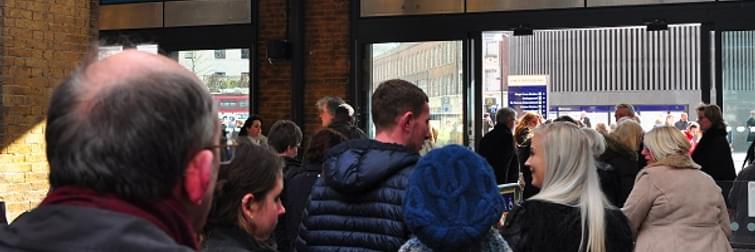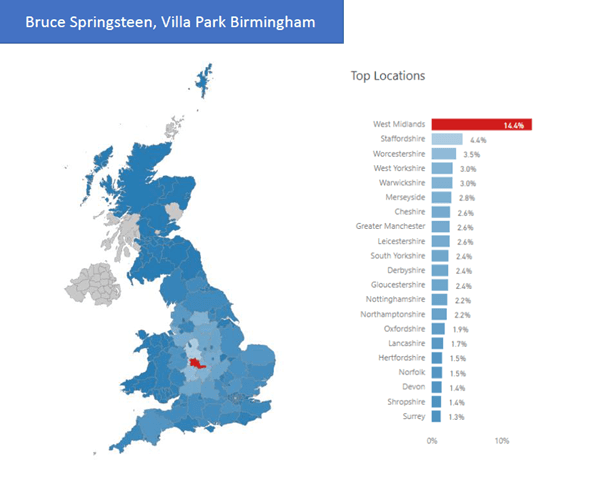
blog: Don’t Be Late For The Boss! – TDM in Action
Wednesday 26th July 2023
Bruce Springsteen… rock star, legend, the boss… sustainable travel advocate? Well, we can’t really claim that last one (although he may be) but we certainly tried our best to promote the sustainable credentials when he recently performed to a sell-out crowd at Villa Park in Birmingham on Friday 16 June.
As part of Kirsty Guttridge’s secondment into Transport for West Midlands (TfWM) as a Senior Travel Demand Management (TDM) Officer, Kirsty (working closely with TfWM colleague Susan Tyler) led the production of a full TDM Strategy for both the Bruce Springsteen and Pink gigs held at Villa Park in June 2023.
Villa Park isn’t new to hosting large-scale events, they hold Premier League home matches on a regular basis and in previous years have also hosted music acts, including the likes of Take That. It is a new ambition of the club though to move more into the summer events space and for any fans of Dave Grohl, you may have seen in the news recently that the Foo Fighters will be performing there in 2024.
In the interest of supporting Aston Villa as they prepare to host more gigs and events in future which will attract a range of people with a range of different travel behaviours, it was agreed that it would be useful to produce the TDM Strategy covering the Pink and Bruce Springsteen gigs.

Villa Park is very used to dealing with travelling football supporters, but this is a group of people who travel to the ground regularly, they know their transport options and often have ingrained travel patterns. By contrast, ticket holders for gigs such as Pink and Bruce Springsteen are often based across a much broader area of the country (some even travelling internationally).
These groups of people may never have been to Birmingham before, let alone Villa Park, and there is a real opportunity early on to reach out to these people and encourage them to consider their transport options.
Any good TDM Strategy begins with data analysis, we must understand the baseline, what is currently happening, how does the transport network perform on a standard day and even a match day in the area in and around Villa Park, what are we dealing with? By understanding the baseline, we can begin to ensure any travel advice and mitigations provided at the end stage are evidence-led.
Our initial analysis of the data showed:
- Congestion could be an issue during the ingress period for the gigs as both of them coincided with the traditional PM peak.
- Due to the predicted congestion issues during ingress, the data suggested it would be beneficial to encourage a spread of the ingress by promoting Birmingham city centre as a place to spend time prior to making your way over to Villa Park.
- Analysis of Metro timetables showed that for those living in the Black Country, late night return trips were possible via this mode which could help balance demand across other transport modes.
- The rail offer was very strong with both Aston and Witton stations just a short walk from Villa Park, “special” services were also added into the timetable by West Midlands Trains to bolster capacity.
- Postcode data analysis highlighted that there were a significant number of ticket holders also travelling from outside the West Midlands, including places such as the East Midlands, the North West and the South East.
- Park and Ride could present a good option for decreasing car use in the area of Aston and encouraging people to make the last leg of their journey via train.
Once the TDM Team had analysed the data, we provided a list of suggested mitigations underneath the three main pillars of TDM: Capacity Creation, Network Management and Behaviour Change.
Working closely with partners across various TfWM Teams such as the Regional Transport Coordination Centre (RTCC), Events and Emergency Planning Team, Network Mitigations Team, Behaviour Change Team and many others, it was then decided which mitigations would be possible.
Some of the resulting mitigations on the back of the TDM Strategy included:
- Evidence led travel advice for both ticket holders and background demand based on the 4Rs of TDM: reduce, re-route, re-time, re-mode.
- Strongly encouraging background demand to avoid the area if they usually travelled through Aston in the PM peak and highlighting that bus and rail services would be busier, giving people a chance to make an informed decision and re-time their journey where possible.
- Stadium screens were utilised inside Villa Park, with information on the last public transport connections provided.
- An extension of the opening hours for Longbridge Park and Ride was requested to make sure people had time to get back to their vehicles (this was a Park and Ride which was promoted heavily due to its capacity and connections to Aston station).
- Dedicated shuttle buses were put on by Aston Villa to transport ticket holders from Birmingham New Street directly to Villa Park and vice versa.
The TDM Team added value for partners by providing bespoke, evidence-led travel advice which could be used on the Aston Villa webpages. The detailed information on last train, bus and rail connections for people to make an informed decision on how and when to leave the stadium post event was also well received. The TDM Team also conducted a pre-event survey which gathered useful information on people’s proposed travel plans – this data set will continue to be useful for TfWM and partners when planning for future events at Villa Park.
While congestion was still experienced in the Aston area, a significant number of people used sustainable modes to travel to and from the gigs. Valuable lessons were also learnt with the testing of the shuttle buses, in future more capacity will be required to help support the demand. The TDM Strategy also highlighted the importance of using evidence-led travel advice and engaging directly with ticket holders at the earliest opportunity regarding transport options for future events.
This was a great project to work on and ITP colleagues will be keen to see what happens as TfWM continue to provide TDM support to Villa Park for future events. It was a real team effort with various internal TfWM colleagues to produce the TDM Strategy.
ITP is experienced in researching, designing, delivering and evaluating behaviour change programmes, including those based around Travel Demand Management. To find out more please visit our Influencing Behaviour page and view our Commonwealth Games case study.
